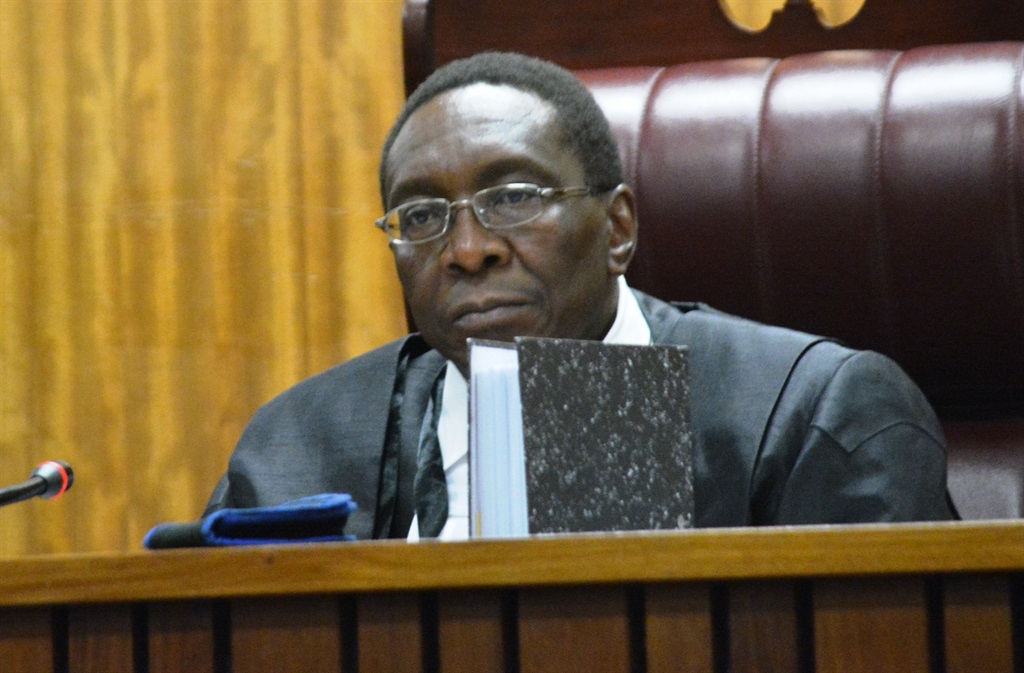


Judge President of the Gauteng Division of the High Court Dunstan Mlambo.
- A full High Court bench has dismissed the DA’s bid to have government stop using BBBEE status, race, gender, age or disability in determining who will receive Covid-19 aid.
- The court also ruled that the criteria used on who gets aid is unlawful and has been set aside because it is too vague.
- It court ruled that Minister of Small Business Development Khumbudzo Ntshavheni must redraft the criteria.
The Gauteng High Court in Pretoria has dismissed the DA’s bid for the minister of small business development to stop using BBBEE status, race, gender, age or disability when considering who gets Covid-19 aid.
At the same time, the court ruled that the the department’s criteria by which people are chosen to receive aid, under the the Debt Finance Scheme and the Business Growth Resilience Fund, be set aside and declared unlawful because they are too vague.
A full bench of the High Court led by Judge President Dunstan Mlambo ruled on Friday that Minister Khumbudzo Ntshaveheni must redraft the regulations on who will be favoured in receiving financial assistance from the two schemes set up to assist with Covid-19 relief.
The court ruled that the minister must include race in the redrafted regulations, despite the DA’s arguments to the contrary.
“In the reformulation of criteria to be employed in the distribution of funds under either the Debt Finance Scheme or the Business Growth Resilience Fund, the minister must take into account race, gender, youth and disability,” Mlambo said.
The DA asked the court to declare it impermissible and unlawful for government to use Broad-Based Black Economic Empowerment (BBBEE) status, race, gender, age or disability as criteria for determining who will receive aid from government during the Covid-19 pandemic.
The court dismissed the DA’s assertions that the government’s decision to use transformation criteria when determining who gets economic relief was illegal.
“The outbreak of Covid-19 in South Africa has brought sharply into focus the fissures in our society caused by race, gender and other forms of egregious discrimination,” the judgment read.
The judgment went further: “If we need any persuasion about the importance of our past and the [deep] seated racial divide in contemporary South Africa and how the need for scarce resources fall overwhelmingly on those who are poor and therefore black, look no further than on whom the brunt of the effect Covid-19 falls.”
Arguing on behalf of the DA, advocate Steven Budlender told the court there was no need for race to be used as a metric to determine who benefits from government funding.
‘Vague statement’
In response, Ntshavheni told the court in an affidavit that race, gender, age and disability were recognised indicators of past and present disadvantage.
The court, however, took exception to the vagueness of the minister’s criteria as to who would receive the government aid.
“It is for the minister to make sure that the criteria to be employed for the disbursement of public funds are not left to a simple laundry list of hygiene and procedural characteristics buttressed by one vague statement that ‘priority would be given’ to women, the youth and the disabled,” the judgment read.
The court said that the minister’s broad phrase, without any guidance as to what weight is given to the criteria mentioned by the minister, did not pass constitutional muster.
For those reasons, the court ruled that criteria used by the department of small business for determining who is entitled to receive funds under the Debt Finance Scheme and the Business Growth Resilience Fund are reviewed and set aside and declared unlawful.
“The appropriate course of action for this court to adopt is to set aside the criteria and refer the matter back to the minister for a redrafting of the regulations in which the minister would be required to consider the role of race, gender, youth and disability in the formulation of the criteria to be applied in the new document which she is now required to prepare as the guide to the decision to disburse moneys in terms of the two funds,” the court said in its judgment.
But the judgment does not affect any funds which have been already been distributed, the court ruled.
No costs were awarded in the matter.

